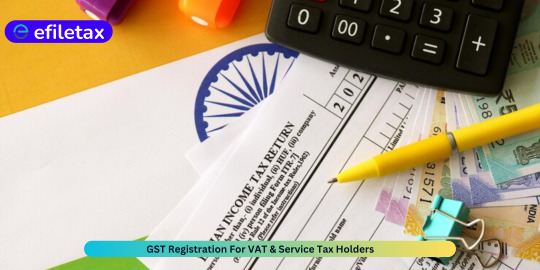#gst services
Text
Private limited company registration
Legal Services is most important for success of any business. We are the best to provide services like private limited company registration that offering private limited company at minimum and affordable prices only with legal zone. Visit for more Information: https://legalzone.biz/service/private-limited-company
#GST registration#return filling#address change in legal documents#Rental agreement#Consult a lawyer#Talk to lawyer#Consult a CA/CS#consultation to CA#Talk to CA#sale deed#will deed#office rental agreement#document review#agreement and affidavits#gst registration tracking#Company Registration#Trademark#GST Services#Registration of Director#income tax return#EPF Registration#Consumer Complaint#Human Rights Complaint
3 notes
·
View notes
Text
GST Registration For VAT & Service Tax Holders

If you were previously registered under VAT (Value Added Tax) or Service Tax and need to transition to GST (Goods and Services Tax) registration, the process typically involves the following steps:
Check Eligibility:
Determine if your business meets the threshold for GST registration. As of my last update, the threshold for GST registration varies based on location and type of business.
Obtain Documents:
Gather necessary documents such as PAN (Permanent Account Number) card, proof of business registration, identity and address proof of promoters/partners/directors, bank account details, etc.
Online Registration:
Visit the GST online portal and fill out the registration form. Provide accurate details about your business, such as the nature of business activities, turnover, etc.
Verification:
After submission, the details will be verified by the GST department. They may seek additional information or documents if required.
Issuance of GSTIN:
Upon successful verification, you'll be issued a GST Identification Number (GSTIN). This is a unique 15-digit identification number that is used for all GST-related transactions.
Transition Period:
Depending on the regulations in your jurisdiction, there may be a transition period during which you'll need to comply with both the old tax system (VAT/Service Tax) and GST.
Compliance:
Ensure compliance with GST regulations, including filing of GST returns, payment of taxes, and maintenance of proper records.
Cancellation of Old Registrations:
Once you are successfully registered under GST, you may need to cancel your old VAT and Service Tax registrations. This step ensures that you're not liable to pay taxes under the previous regime.
It's important to note that the process might vary slightly based on your location and specific circumstances.
Therefore, it's advisable to consult with a tax professional or visit the official GST portal of your country for the most accurate and up-to-date information. For all your business solutions efiletax.
0 notes
Text
GST registration in Delhi NCR
Corporate Seva Kendra is your trusted partner for Income Tax Return services in Delhi! 📊 Our expert team ensures precision and compliance, making the tax filing process seamless for businesses. Maximize your returns with personalized assistance. Income Tax Return in Noida? Choose Corporate Seva Kendra for a tax season. Additionally, we offer GST registration services in Delhi NCR to cater to all your business needs.

0 notes
Text
#ted lasso#the owl house#welcome home#wally darling#accountants institute in chandiagrh#gst services
0 notes
Text
Unleash Your Business Implicit Get GST Registration with Muneemg
Are you ready to take your business to the coming position? Look no farther! Muneemg is then to streamline your GST enrollment process, making it easier than ever to misbehave with duty regulations and unlock growth openings for your business. Why choose Muneemg for your GST Registration needs? Then is what sets us piecemeal Expert Guidance Our platoon of educated professionals understands the sways and outs of GST enrollment . We will guide you through every step of the process, icing compliance with all applicable laws and regulations. effectiveness Time is plutocrat, and we value both. With Muneemg, you can say farewell to the hassle of navigating complex paperwork and lengthy processes. We will handle everything fleetly and efficiently, so you can concentrate on what you do stylish – running your business. Cost-Effective results We believe in furnishing top- notch services at affordable prices. With Muneemg, you will get quality backing without breaking the bank. Our transparent pricing ensures no surprises along the way. Peace of Mind With Muneemg by your side, you can rest easy knowing that your GST enrollment is in able hands. We will insure compliance with all legal conditions, giving you peace of mind to concentrate on growing your business.
0 notes
Text
CA Service online

In today's digital era, the world of financial management and compliance has evolved dramatically. Businesses and individuals alike seek efficient, reliable, and convenient solutions to manage their financial affairs. Enter CA service online – a revolutionary approach to chartered accountancy services that brings expertise right to your fingertips. At the forefront of this digital transformation is MuneemG, a leading CA firm committed to delivering top-notch online CA services tailored to meet your specific needs.
Why Choose CA Service Online with MuneemG?
Convenience: With CA service online, you can access professional accounting and tax services anytime, anywhere. Whether you're a busy entrepreneur or an individual taxpayer, our online platform offers seamless integration, making it easier than ever to manage your finances on the go.
Expertise: MuneemG boasts a team of highly qualified and experienced chartered accountants who are well-versed in the latest financial regulations and industry trends. Our online CA services ensure that you receive accurate and up-to-date advice, enabling you to make informed financial decisions with confidence.
Customized Solutions: At MuneemG, we understand that every client is unique. That's why we offer personalized CA service online to cater to your specific requirements.
Secure and Confidential: Protecting your sensitive financial information is our top priority. Our online platform utilizes advanced encryption and security protocols to safeguard your data, ensuring complete confidentiality and peace of mind.
Our Online CA Services Include:
Tax Consultation and Planning: Expert advice on tax optimization, compliance, and planning to help you minimize liabilities and maximize savings.
Accounting and Bookkeeping: Comprehensive online accounting solutions, including financial statement preparation, payroll management, and more.
Audit and Assurance: Thorough online auditing services to ensure regulatory compliance and enhance the credibility of your financial statements.
Financial Advisory: Personalized financial planning and consulting services to help you achieve your long-term goals and aspirations.
Experience the Future of Chartered Accountancy with MuneemG
Embrace the convenience, efficiency, and expertise of CA service online with MuneemG. Our commitment to excellence, combined with our innovative online platform, sets us apart as a trusted partner in your financial journey. Whether you're a small business owner, a large corporation, or an individual seeking professional financial guidance, we are here to assist you every step of the way.
0 notes
Text
What is the list of services under RCM in GST 2022?
Several goods fall under the Reverse Charge Mechanism (RCM) in GST 2023, including:
Bidi wrapper leaves purchases
Raw cotton purchases
Unpeeled or unshelled cashew nut purchases
Cement purchases
Tobacco leaves purchases
Goods Transport Agency services
Lottery ticket purchases
Silk yarn purchases
Priority sector lending certificate purchases
0 notes
Text
CA Gurpreet Singh Bhalla GST Consultant in Kanpur | CA in Kanpur
A Chartered Accountant with a very wide experience in Taxation and Accounting. Specialist in GST Compliance, GST Notices and Appeals. Our Services include: gst registration services gst consultant company registration services llp company registration services opc company registration gst filing services company formation services accounting services For further discussion, let's connect over a call...!
GST Consultant in Kanpur
1 note
·
View note
Text
0 notes
Text
GST Course in Hyderabad
The complexities of Goods and Services Tax (GST) with Accounting Mastery's comprehensive course. From understanding the fundamentals to navigating intricate regulations, our expert-led program equips you with the knowledge and skills to confidently manage GST compliance and optimization in your business operations
0 notes
Text
Section 234F of the Income Tax Act - Penalty for Late Filling

What is Section 234F of the Income Tax Act?
The Finance Act of 2017 introduced Section 234F of the Income Tax Act, which deals with the problem of late income tax return filing. Encouraging timely filing and streamlining the tax administration are the main goals. This section pertains to all individuals who must file income tax returns in India.
The Income Tax Act penalizes individuals for filing income tax returns (ITRs) after the deadline, as stated in Section 234F. This section came into effect for the 2018–19 assessment year.
Who is required to file an Income Tax Return?
Filing an Income Tax Return (ITR) is mandatory under the following circumstances:
1. Exceeding Basic Exemption Limit: Filing an ITR is required if an individual's total income exceeds the basic exemption limit.
2. Age-specific Income Criteria: When an individual's income surpasses Rs. 2.5 lakhs, they are required to file a return, regardless of age. The threshold is Rs. 3 lakhs for senior citizens (60 years or older) and Rs. 5 lakhs for super senior citizens (80 years or older). Notably, this cap was raised to Rs. 5,000,000 for extremely senior citizens and Rs. 3 lakhs for individuals under the new tax regime that was unveiled in the Budget 2023.
Under the old tax regime, the Basic exemption limit is calculated without considering any deductions from capital gains under sections 54, 54B, 54D, 54EC, 54F, 54G, 54GA, or 54GB, or deductions under Section 80C to 80U.
Important Note: Assessee Opting for the new tax regime will not be allowed to avail the above-mentioned deductions.
3. Assets Abroad and Foreign Accounts: If they have signing authority over foreign accounts or own assets or financial interests in entities outside of India, citizens and regular residents of India are required to file a return.
4. Bank Deposits: An ITR must be filed if you deposit Rs. 1 crore or more in one or more bank current accounts.
5. International Travel Expenses: Individuals spending more than Rs. 2 lakhs on international travel during the previous year are required to file a return.
6. Substantial Power Consumption: Filing an ITR becomes mandatory for those spending more than Rs. 1 lakh on power consumption in the preceding year.
7. Profession Gross Receipts: If the total gross receipts from a profession exceed Rs. 10 lakhs in the previous year, filing an ITR is necessary.
8. TDS and TCS Threshold: If the total TDS and TCS amount for the prior year was Rs. 25,000 or more, individuals under the age of 60 are required to file a return. The threshold is raised to Rs. 50,000 for senior citizens.
9. Business Turnover Requirement: Individuals with business turnovers exceeding Rs. 60 lakhs in the preceding year are required to file a tax return.
10. High Savings Bank Deposits: Filing an ITR is necessary if an individual's total deposit in one or more savings bank accounts during the previous year is Rs. 50 lakhs or more.
What is the last date to file ITR?
The due date for filing Income Tax Returns (ITR) in India can vary based on the type of taxpayer and the applicable audit provisions.
Individuals, Hindu Undivided Families (HUFs), and taxpayers whose accounts are not required to be audited: Usually, the deadline is July 31st of the assessment year. For the fiscal year 2021–2022, for instance, the deadline would be July 31, 2022.
Taxpayers whose accounts are required to be audited (including companies):
September 30th of the assessment year is the deadline. For instance, September 30, 2022 would be the deadline for the fiscal year 2021–2022.
Nonetheless, the deadline for filing an ITR is November 30 of the assessment year if the company has any foreign transactions or specified domestic transactions for which it must provide a report in Form No. 3CEB u/s section 92E.
How to file Challan No. 280 to pay the 234F Fees?
Challan No. 280 is the form for remitting penalties related to the non-filing or late filing of Income Tax Returns (ITR). To make a payment through Challan No. 280, the assessee must complete the following steps:
1. Assessment Year and Tax Type: Indicate the relevant Assessment Year and choose the applicable tax type, distinguishing between corporate tax and others.
2. PAN (Permanent Account Number): Enter the PAN or Permanent Account Number in the provided space on the challan.
3. Name and Residential Address: Provide the full name and complete residential address of the assessee.
4. Contact Details: State a phone number along with the STD code for communication purposes.
5. Select Tax Type: Choose the appropriate type of tax from the following options:
Advance Tax
Surcharge
Self-Assessment Tax
Tax on Regular Assessment
Tax on Distributed Profits of Domestic Companies
Tax on Distributed Income to Unit Holders
6. Payment Details: Fill in the payment details, ensuring accuracy in the entered information.
7. Bank Information: Specify the precise date of payment, the name of the bank, and the branch where the payment is being made.
8. Signature: Affix the signature of the individual making the payment.
9. Counterfoil Details: In the counterfoil section, provide the details as shown in the form, including PAN, name of the bank and branch, assessment year, etc.
Accurately completing these steps guarantees a seamless and error-free Challan No. 280 payment process. It's also advised to keep a copy of the counterfoil for documentation's sake. It is advisable to consult the most recent guidelines provided by the tax authorities or seek advice from a tax professional if any doubts or inquiries arise during the process.
Loss Carry Forward Restriction:
Failure to file by the deadline limits the amount of losses in your business or under the head capital gains that can be carried forward, which could have an impact on future tax benefits.
Delayed Refund Processing: In order to guarantee that people receive their overpaid taxes as soon as possible, timely filing is crucial to accelerating the processing of refunds.
How can you avoid giving the Income Tax Department the money due under section 234F?
It is imperative that you file your Income Tax Return (ITR) by the specified deadline in order to avoid having to pay the late filing penalties under Section 234F of the Income Tax Act. The following crucial actions can help you avoid paying late filing fees:
1. File Your ITR on Time: The most straightforward way to avoid late filing fees is to file your ITR on or before the specified due date. For individual taxpayers, the due date is typically July 31 of the assessment year.
2. Be Aware of Due Dates: Remain aware of the ITR filing deadlines. Depending on the type of taxpayer, audit requirements, and other variables, the deadline may change. Look for any updates or extensions from the Department of Income Taxation.
3. Keep Track of Changes in Regulations: Keep an eye out for updates to late filing penalties, deadlines, and other relevant provisions when it comes to tax regulations. You can prepare and file your returns on time if you keep yourself informed.
4. Use Electronic Filing (e-filing): Make use of the Income Tax Department's electronic filing (e-filing) option. E-filing typically saves time and improves convenience, so there's less chance that your ITR submission will be delayed.
5. Organize Your Financial Documents: Make sure you have all the required financial information and documentation well in advance. Maintaining organisation will make filing easier and ensure that your ITR is submitted on time.
6. Seek Professional Assistance: Seek advice from a tax expert if you find the tax filing process difficult or if your financial situation is more complicated. They can help you file on time and walk you through the procedure.
7. Make Use of Reminder Tools: Set up reminders on your calendar or use digital tools to receive notifications about upcoming tax deadlines. This will help you stay proactive and avoid unintentional delays.
8. Consider Advance Tax Payments: Consider paying your taxes in advance if you have a sizable income that isn't subject to tax deduction at source (TDS). By doing this, you can pay your taxes throughout the year rather than all at once when you file.
9. Plan for Contingencies: Be prepared for obstacles that might cause your filing to be delayed, such as unforeseen events or technical problems. Make the necessary plans to submit your ITR well in advance of the deadline.
By following these procedures, you can reduce the possibility that you won't make the filing deadline and, as a result, stay out of trouble with Section 234F's late filing fees. Maintaining awareness, organisation, and initiative in meeting your tax responsibilities is essential.
0 notes
Text
Section 194O of the Income Tax Act

Section 194O of the Income-tax Act, 1961 deals with Tax Deducted at Source (TDS) on payments made to e-commerce participants. It was introduced in the Union Budget 2020 and came into effect on 1st October 2020.
Here's a summary of the key points of Section 194O:
Who is responsible for deducting TDS?
E-commerce operators like Amazon, Flipkart, Meesho, etc., are responsible for deducting TDS at the rate of 1% on the gross amount of sales made through their platform by sellers (e-commerce participants).
What transactions are covered?
The TDS applies to sales of goods, provision of services, or both facilitated through the e-commerce platform. This includes professional and technical services as well.
When is the TDS deducted?
The TDS is deducted at the time of crediting the seller's account, irrespective of the mode of payment, or at the time of making payment to the seller, whichever is earlier.
Threshold limit:
There is no threshold limit for e-commerce companies. They are required to deduct TDS on all transactions facilitated through their platform. However, for individual/HUF e-commerce participants, no TDS is deducted if the gross amount of sales during the previous year does not exceed Rs 5 lakh and they have furnished their PAN or Aadhaar.
Purpose of Section 194O:
This section aims to improve tax compliance by bringing e-commerce participants under the TDS net. Many small sellers operating on e-commerce platforms often miss filing their income tax returns. By collecting TDS at the source, the government ensures that some tax is collected upfront even if the seller doesn't file their returns.
I hope this summary is helpful. If you have any further questions about Section 194O or its implications, feel free to ask!
Gaurav Sharma
8878797882
Infinityservices2018.com
#income tax#gst refund#gst billing software#gst registration#gst services#TDS#tax deducted at source#TCS
0 notes
Text
Do Foreign Subsidiaries Have to Pay Taxes in India?

Expanding a business internationally often involves setting up subsidiary companies in foreign countries to facilitate operations and market penetration. However, one critical consideration for foreign subsidiaries operating in India is their tax obligations. Let's delve into whether foreign subsidiaries have to pay taxes in India and explore the implications for businesses.
Tax Residency Status:
The tax liability of a foreign subsidiary in India depends on its residency status for taxation purposes. In India, companies are classified as resident or non-resident based on their control and management location:
Resident Company: A company is considered a resident in India if its control and management are wholly situated within India during the relevant financial year. Resident companies are taxed on their global income, including income earned abroad.
Non-Resident Company: If a foreign subsidiary's control and management are located outside India, it is treated as a non-resident company for tax purposes. Non-resident companies are typically taxed only on income sourced from India.
Taxation of Foreign Subsidiaries in India:
Foreign subsidiaries operating in India are subject to taxation on income derived from Indian sources, including:
Business Profits: Income generated from business activities conducted within India, such as sales, services, and manufacturing, is taxable in India.
Capital Gains: Gains arising from the transfer of assets situated in India, such as shares of Indian companies or immovable property, are subject to capital gains tax in India.
Interest, Royalties, and Dividends: Income received by foreign subsidiaries in the form of interest, royalties, or dividends from Indian entities is subject to withholding tax in India.
Permanent Establishment (PE): If a foreign subsidiary has a PE in India, it is taxed on profits attributable to that PE. A PE can include a branch, office, factory, or any other place of business through which the foreign company carries out its operations in India.
Double Taxation Avoidance Agreements (DTAA):
India has signed DTAA with various countries to prevent double taxation and provide relief to foreign subsidiaries. Under DTAA, foreign subsidiaries may be eligible for tax credits or exemptions in their home country for taxes paid in India, reducing the overall tax burden.
Compliance Requirements:
Foreign subsidiaries operating in India must comply with various tax laws and regulations, including:
Filing of Tax Returns: Foreign subsidiaries must file income tax returns in India and disclose all income earned from Indian sources.
Transfer Pricing Regulations: Transactions between the foreign subsidiary and its Indian counterparts must comply with transfer pricing regulations to ensure that they are conducted at arm's length.
Goods and Services Tax (GST): If the foreign subsidiary engages in the supply of goods or services in India, it may be required to register for GST and comply with GST filing requirements.
Conclusion:
In conclusion, foreign subsidiaries operating in India are generally subject to taxation on income derived from Indian sources. Understanding the residency status, taxation rules, and compliance requirements is essential for foreign subsidiaries to navigate the Indian tax landscape effectively. Seeking advice from tax professionals and ensuring compliance with applicable laws can help foreign subsidiaries optimize their tax position and mitigate risks associated with tax liabilities in India. For more details visit efiletax.
0 notes
Text
Optimize Your Finances with Effective GST Services in India | The Tax Planet
Revamp your financial strategy with effective GST services in India. The Tax Planet helps you streamline your finances and boost efficiency through expert guidance. Navigate the complexities of taxation seamlessly with our dedicated team, ensuring compliance and maximizing returns. From meticulous record-keeping to timely filings, we've got them covered for your financial needs. Stay ahead in the ever-evolving financial landscape with our comprehensive GST services. The Tax Planet is your trusted partner for optimizing finances, offering tailored solutions to meet your business requirements. Elevate your financial game and embrace success with our reliable GST services which meet the dynamic Indian market.
1 note
·
View note
Text
*Amendment of GST and Service Tax GST Registration*
👉🏻Contact us now 📞 +91-9811811991 / 9355533535
👉🏻Inquiry Form:- https://forms.gle/f1cyTwU9fetVMZkA8

1 note
·
View note
Text
Demystifying GST Registration: A Comprehensive Guide
Introduction: In the realm of taxation, the Goods and Services Tax (GST) stands as a pivotal reform that streamlines the indirect tax structure in India. Since its implementation, GST has brought about significant changes in the way businesses operate and comply with tax regulations. One of the primary obligations imposed by GST law on businesses is the requirement for GST registration. In this blog post, we delve into the nuances of GST registration, its significance, and the procedural aspects surrounding it.
Understanding GST Registration: GST registration is essentially the process through which a business entity becomes a recognized taxpayer under the GST regime. Any business engaged in the supply of goods or services with a turnover exceeding the prescribed threshold limit is mandated to register for GST. This threshold limit varies based on the nature and location of the business.
Significance of GST Registration:
Legal Compliance: Registering under GST ensures compliance with the law, shielding businesses from potential penalties and legal repercussions.
Input Tax Credit (ITC): Only registered businesses can avail themselves of the benefit of claiming input tax credit on GST paid on purchases, thereby reducing the overall tax burden.
Business Credibility: GST registration lends credibility to a business, especially in the eyes of other registered entities, government authorities, and potential customers.
Interstate Transactions: For businesses engaged in interstate supply of goods or services, GST registration is indispensable.
Who Needs to Register for GST?
Mandatory Registration: Businesses whose aggregate turnover exceeds the prescribed threshold limit are required to register for GST.
Voluntary Registration: Even if a business does not meet the mandatory turnover criteria, it can opt for voluntary registration to avail itself of the benefits of GST and facilitate interstate transactions.
Procedure for GST Registration:
Online Application: The registration process is primarily conducted online through the GST portal (www.gst.gov.in).
Form Submission: Applicants need to fill out Form GST REG-01 with requisite details such as business PAN, Aadhaar number, business address, bank account details, etc.
Verification: Post submission, the application undergoes verification by the GST authorities.
Approval and Certificate Issuance: Upon successful verification, the GST registration certificate is issued electronically, granting the applicant the status of a registered taxpayer under GST.
0 notes